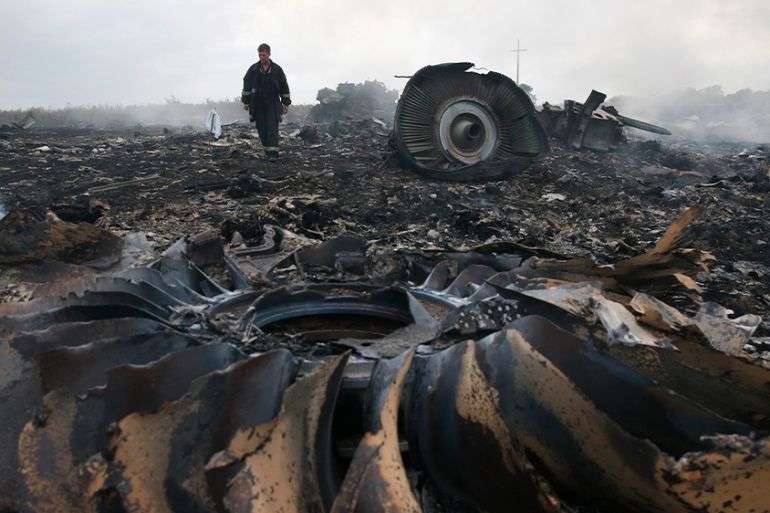MH17: ‘Strong indications’ Putin approved missile supply
Investigators say while the chain of command to the Russian president is clear, he has immunity and there is insufficient evidence to prosecute more people.

An international team of investigators has said there are “strong indications” that Russian President Vladimir Putin approved the supply of the missile to separatists who shot down Malaysia Airlines flight MH17 over eastern Ukraine in 2014.
But members of the Joint Investigation Team (JIT) in the Netherlands said they did not have enough evidence to prosecute any more suspects and suspended their eight-and-a-half-year inquiry into the tragedy. As a head of state, Putin also has immunity.
Keep reading
list of 4 itemsDutch court convicts three MH17 suspects, acquits one
Netherlands, Australia launch new case against Russia over MH17
Angry families demand justice from Russia at MH17 crash trial
MH17 was shot down by a Russian missile launched from eastern Ukraine as it was on its way to Kuala Lumpur from Amsterdam on July 17, 2014. All 298 people on board the Boeing 777 were killed.
Russia denied involvement in the incident and refused to cooperate with the international investigation.
“There are strong indications that a decision was made at presidential level, by President Putin, to supply… the Buk TELAR” missile system, Dutch prosecutor Digna van Boetzelaer said on Wednesday.
Investigators have already confirmed that the Buk brought down the Malaysian plane, which was flying at 33,000 feet (10km).
“Although we speak of strong indications, the high bar of complete and conclusive evidence is not reached,” she told a news conference in The Hague.
The announcement comes less than three months after a Dutch court convicted two Russians and a Ukrainian for murder over the disaster. The three men – Russians Igor Girkin and Sergei Dubinsky and Ukrainian Leonid Kharchenko — did not appear for the trial and are unlikely to ever serve their life sentences.
Some 196 of those who died in the crash were from the Netherlands and Dutch Prime Minister Mark Rutte said that while the JIT’s decision to suspend the inquiry was a “bitter disappointment”, the Dutch government would “continue to call the Russian Federation to account”.
Australia, the home of 38 passengers, promised the same.
Foreign Minister Penny Wong and Attorney General Mark Dreyfus said Russia had repeatedly tried to thwart the investigation.
“Russia’s illegal and immoral invasion of Ukraine and its lack of cooperation with the investigation have rendered ongoing investigative efforts and the collection of evidence impossible at this time,” they said in a joint statement on Thursday.
Australia would “hold Russia to account for its role in the downing of the civilian aircraft,” they added.
Chain of command
Russia condemned last year’s court verdict convicting the three men as “scandalous” and politically motivated.
The JIT – made up of the Netherlands, Malaysia, Australia, Belgium and Ukraine – said, however, that the chain of command was clear.
Russian officials even postponed a decision to send weapons to Ukrainian separatists because Putin was at a D-Day commemoration in France in June 2014, they said, playing an intercepted telephone call from an adviser saying the delay was “because there is only one who makes a decision… the person who is currently at a summit in France”.
Putin himself could also be heard speaking about a “military component” in another call with a separatist leader from the Luhansk region of Ukraine.
Families of the victims said they were disappointed by the decision to halt the investigation.
“We had hoped for more but we didn’t count on it,” said the chairman of an MH17 foundation, Piet Ploeg, who lost his brother, sister-in-law and nephew in the disaster.
Investigators said they felt they had achieved more than they thought possible in 2014.
“Are we disappointed? No, because we think we came further than we had ever thought in 2014. Would we have liked to come further? Of course, yes,” said Andy Kraag of the Dutch police, adding that “the answer remains in Russia”.
Van Boetzelaer said that while the investigation was being suspended, phone lines would remain open for possible witnesses who may still want to provide evidence. If that happens, the inquiry could be reactivated.
Other cases over MH17 are also being pursued.
The Dutch and Ukrainian governments are suing Russia at the European Court of Human Rights while the Dutch and Australian governments have also begun proceedings at the International Civil Aviation Organization.
The findings revealed on Wednesday are likely to strengthen the case at the human rights court and could also be used by prosecutors at the International Criminal Court, who are investigating possible war crimes in Ukraine dating back to the start of the separatist conflict.